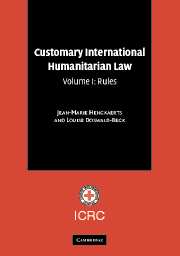Book contents
- Frontmatter
- Contents
- Foreword by ICRC President Jakob Kellenberger
- Foreword by Judge Abdul G. Koroma
- Foreword by Yves Sandoz
- Acknowledgements
- Introduction
- List of abbreviations
- Part I The Principle of Distinction
- Part II Specifically Protected Persons and Objects
- Part III Specific Methods of Warfare
- Chapter 15 Denial of Quarter (Rules 46–48)
- Chapter 16 Destruction and Seizure of Property (Rules 49–52)
- Chapter 17 Starvation and Access to Humanitarian Relief (Rules 53–56)
- Chapter 18 Deception (Rules 57–65)
- Chapter 19 Communication with the Enemy (Rules 66–69)
- Part IV Weapons
- Part V Treatment of Civilians and Persons Hors De Combat
- Part VI Implementation
Chapter 18 - Deception (Rules 57–65)
Published online by Cambridge University Press: 05 June 2012
- Frontmatter
- Contents
- Foreword by ICRC President Jakob Kellenberger
- Foreword by Judge Abdul G. Koroma
- Foreword by Yves Sandoz
- Acknowledgements
- Introduction
- List of abbreviations
- Part I The Principle of Distinction
- Part II Specifically Protected Persons and Objects
- Part III Specific Methods of Warfare
- Chapter 15 Denial of Quarter (Rules 46–48)
- Chapter 16 Destruction and Seizure of Property (Rules 49–52)
- Chapter 17 Starvation and Access to Humanitarian Relief (Rules 53–56)
- Chapter 18 Deception (Rules 57–65)
- Chapter 19 Communication with the Enemy (Rules 66–69)
- Part IV Weapons
- Part V Treatment of Civilians and Persons Hors De Combat
- Part VI Implementation
Summary
Rule 57. Ruses of war are not prohibited as long as they do not infringe a rule of international humanitarian law.
Practice
Volume II, Chapter 18, Section A.
Summary
State practice establishes this rule as a norm of customary international law applicable in both international and non-international armed conflicts.
International armed conflicts
This is a long-standing rule of customary international law already recognised in the Lieber Code and the Brussels Declaration, and codified in the Hague Regulations. It is also set forth in Additional Protocol I.
The rule permitting ruses of war is stated in numerous military manuals. It is supported by several official statements and other practice.
Non-international armed conflicts
This rule was included in the draft of Additional Protocol II by Committee III of the Diplomatic Conference leading to the adoption of the Additional Protocols, but was deleted at the last moment as part of a package aimed at the adoption of a simplified text. In addition, it is contained in other instruments pertaining also to non-international armed conflicts.
The rule permitting ruses of war provided they do not infringe a rule of international humanitarian law is set forth in military manuals which are applicable in or have been applied in non-international armed conflicts. Colombia's Constitutional Court ruled in 1997 that the use of military tactics and stratagems must be in conformity with constitutional standards, implicitly recognising that they may be applied in non-international armed conflicts.
- Type
- Chapter
- Information
- Customary International Humanitarian Law , pp. 203 - 226Publisher: Cambridge University PressPrint publication year: 2005



